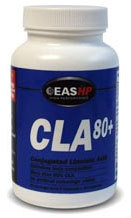EAS CLA 80 Plus
Q: What exactly is CLA?
A: CLA stands for conjugated linoleic acid. It’s a naturally occurring fatty acid in a number of foods. It was originally isolated in cooked ground beef, believe it or not, about ten years ago. Fatty acids are the molecules that make up a fat, in sort of the same way amino acids are the molecules that make up a protein. Examples of other fatty acids include linoleic acid and linolenic acid. What exactly does conjugated mean? Well, it simply means the molecule has what’s known as two double carbon bonds, separated by one single bond. You chemists out there will understand that perfectly, but for those of you who are experts in some other field, suffice it to say that those conjugated double bonds give it properties very different from regular linoleic acid (the kind found in flax oil or borage oil). CLA is not a drug. In fact, it’s found in relatively large quantities in some foods like dairy products, beef and veal, and even turkey. The average person probably gets up to one gram a day just by eating regular foods. The trouble is, you’d probably have to eat more meat or more cheese than you ever dreamed of to get enough CLA to see any beneficial effects. For instance, cheeses have an average of between 2.9 mg and 7.1 mg of CLA per gram of fat. You’d have to eat cheese on the order of several pounds a day to get anywhere near the four-gram dosage that appears to be beneficial to humans. It makes more sense to consume CLA supplements that contain a high concentration of this unique fatty acid.
